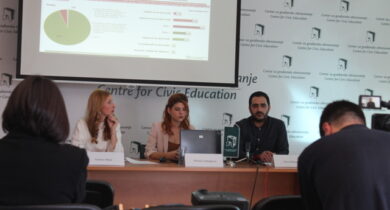Centre for Civic Education (CCE) has today, within the project SPINoFACT 2 – Political advertising between spin and facts’, presented first findings of monitoring of media campaign for presidential elections which are to be conducted on 15 April 2018. CCE project assistant, Bojana Knezevic, emphasized that this is an overview of campaign in media in… »
Research
Bad perspectives of youth in employment, abundant space for improvement with all actors
Citizens of Montenegro in majority assess that young people are in bad position when it comes to employment, as findings of research of the Centre for Civic Education (CCE) point out, which was conducted within the project ‘Knowledge and Skills for Job!’, with the aim to shed light on perception of position of youth and… »
Media reported the most about local elections in Cetinje, polarization remains
During campaign for local elections in Cetinje, Mojkovac and Petnjica, the Montenegrin media reported the most about Cetinje elections, while the election campaign should be extended in order to enable citizens to get as realistic a picture as possible of the options available to them. This was pointed out by research of the Centre for… »
Foreign-policy priorities of Montenegro affirmed among citizens
Centre for Civic Education (CCE) assesses that large majority of Montenegrin citizens remains comitted to key foreign policy priorities of Montenegro, which can also be read from the most preferred countries for living which is a solid basis for further work on their intensification. CCE has, in cooperation with IPSOS agency, asked citizens: ‘If you… »
PWD still in unequal position in access to labour market
Centre for Civic Education (CCE) has today, in the framework of the project “Employment to Inclusion”, presented findings of the Public opinion research on perception of persons with disabilities (PWD) in the process of employment. Marija Cimbaljevic, CCE project assistant, reminded that within this project eight persons with disabilities (PWDs) from Podgorica, Danilovgrad and Nikšić… »
Are free textbooks truly free or part of election activities?
At presentation of research Are free textbooks truly free? that Centre for Civic Education (CCE) organized today, Mira Popović, CCE programe associate reminded of the international and constitutional obligations of Montenegro to ensure free primary education, noting: «However, the practice shows that the Constitution does not have binding force and that its consistent application depends… »
What do Europeans think, know and expect from the European Union?
Centre for Civic Education (CCE) today organised a press conference in its premises whereby it presented the results of opinion polls on the opinion, knowledge and expectations of Europeans from the European Union, as part of the project “Homo Europeanus – Overcoming the Knowledge Deficit”, implemented with the support of European Commission through the Europe for… »
Results of annual research on the media financing from public funds in Montenegro presented
Centre for Civic Education (CCE) organised a conference today, with the support of British Embassy in Podgorica, titled « Media financing from public funds in Montenegro ». H.E. Ian Whitting, British ambassador in Montenegro, opened the conference and elaborated the motives of Embassy’s participation in this project by pointing out: “Everyone who lives in a… »
Who proposed 172 honorary citizenships to the Government?
Centre for Civic Education (CCE) received a response from the Ministry of Interior and Public Administration (MoI) regarding the names of persons who were proposed by the president of Government of Montenegro for the honorary citizenship, as well as the number and list of the remaining persons who were not amongst those proposed for honorary… »
Why are the public sector bodies applying unevenly the Law on Free Access to Information?
Centre for Civic Education (CCE) indicates that the Law on Free Access to Information is still not being perceived as an obligatory legal act by all public sector bodies, which consequently leads to uneven application of the same, but also to endangerment of the right of public to receive information of public importance. Through the… »

